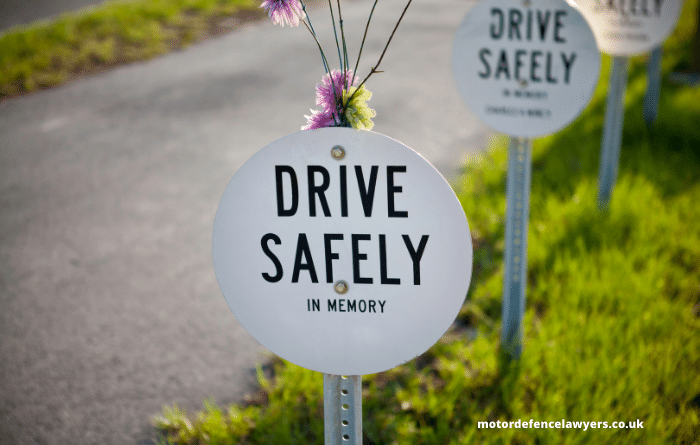Why Choose Us
- Ranked in the top 3 law firms by Trustpilot
- Nationwide Legal Coverage
- Free Consultation
- Fixed Fee Terms
- Competitive Rates
- Flexible Payment Plans
- Trusted Legal Care
- UK’s Leading Motoring Solicitors
5 out of 5
Our customers rate us
“EXCELLENT”
AS SEEN ON
28.02.2022
Death by Dangerous Driving Sentencing Guidelines
As death by dangerous driving is such an extremely serious criminal offence, the sentencing guidelines are such that the punishment can lead to life imprisonment. It is therefore of the utmost importance that drivers act carefully and competently on the roads so that the safety of all road users can be ensured.
Should you find yourself charged with an offence of dangerous driving it may be the case that you wish to mitigate any potential sentence or indeed challenge the charge brought. This article will provide clarity on the options available to you and the potential sentences that could be imposed.
Facing a charge of causing death by dangerous driving? We specialise in Dangerous Driving Law – Contact Caddick Davies Solicitors today
Send us a message or call us on 0333 443 2366 for friendly advice
Section 1 of the Road Traffic Act 1988 describes the offence as causing “the death of another person by driving a mechanically propelled vehicle dangerously on a road or other public place”.
A person is described to be driving dangerously in Section 2A(1) if:
If the manner in which you have driven fulfils the requirements of (a) and (b) above, and it has led to the death of another then you would be guilty of this offence.
Furthermore, the extension of Section 2A(2) it is often overlooked in that
“A person is also to be regarded as driving dangerously for the purposes of sections 1 and 2 above if it would be obvious to a competent and careful driver that driving the vehicle in its current state would be dangerous”.
Drivers must take care to ensure that both their vehicle and manner of driving does not fall into the realms of ‘dangerous’.

The sentencing guidance for this offence is split into three categories which represent corresponding levels of culpability. Culpability A being the highest and culpability C being the lowest.
Culpability C
Culpability B
Culpability A
Culpability is simply another way of describing ‘fault’ or ‘wrongdoing’. It relates heavily to the circumstances of the offence and more importantly how much blame can be apportioned to you for the offence. The sentencing guidance used by the court provides an exhaustive list of considerations when determining culpability. The following will guide the court in categorising your level of culpability from A-C.
A
B
C
Should a Defendant be charged with one offence of causing death by dangerous driving which caused the death of more than one individual, the court would look to make an upwards adjustment to the starting point within each category before considering any other mitigating or aggravating factors.
Comparatively, if a number of deaths is caused but they are charged under separate offences the court would look to have sentences run concurrently.
This consideration is, of course, extremely relevant in road traffic cases where there are often multiple occupants to each vehicle.
Alongside the court’s consideration of culpability, there will also be a review of any further aggravating or mitigating circumstances. Some of the most common aggravating factors are:
Conversely, there are certain factors which may mitigate the sentence and can be taken into consideration by the court. Of particular relevance is:
Of course, there are many mitigating and aggravating factors to consider in cases of this nature and the specifics of each individual case may impact the sentence imposed. It is advisable to contact a legal professional to obtain more detailed advice on your options.
Alongside a custodial sentence, the court must also endorse an obligatory driving disqualification of 5 years with a requirement for an extended re-test. This means that even after the 5-year disqualification period has elapsed you will be unable to drive until you have re-completed your practical and theory tests.
If the offence occurred prior to the 28th June 2022 then the obligatory disqualification length is 2 years.
Facing a charge of causing death by dangerous driving? Contact Caddick Davies Solicitors today
Send us a message or call us on 0333 443 2366 for friendly advice
As with all criminal charges, you have the option to either enter a plea of guilty or not guilty. The approach you take is ultimately your own decision and due to the serious and complex nature of these cases your options are best discussed with a legal professional.
However, most defences to this charge are based upon a factual denial. Any element of the offence can be denied such as driver identity, that your driving was not dangerous or that your driving did not lead to the death of the victim.
Other potential defences include:
Most defences can be extremely technical and may require the instruction of expert witnesses and the review of complex evidence.
In challenging the charge of death by dangerous driving, the court may determine that you are guilty of the lesser offence of death by careless driving.
The basic distinction between the two charges is that for dangerous the standard of driving must fall ‘far below’ that of a competent and careful driver whereas for careless the standard must simply fall ‘below’ the competent and careful driver.
In addition to the above, there is a further requirement in dangerous driving charges for it to be obvious to a careful and competent driver that driving in that manner would be dangerous. This requirement adds an element of knowledge or indeed culpability to death by dangerous driving offences.
Death by careless driving is an alternative offence and will often be the charge proceeded with when the driving behaviour falls short of that necessary for dangerous.
As noted previously, there are a number of mitigating factors which can be considered in death by dangerous driving cases.
Focussing on mitigation is an extremely useful tactic in cases where you are either found guilty after trial or wish to enter a guilty plea. Due to the sentencing range available, mitigation could potentially reduce the relevant custodial sentence by several years.
It is also very important to outline the benefit of credit for an early guilty plea. Credit reduces the length of the custodial sentence imposed, with the amount of credit provided mainly depending on the time at which the plea is entered:
Facing a charge of causing death by dangerous driving? Contact Caddick Davies Solicitors today
Send us a message or call us on 0333 443 2366 for friendly advice

The offence of death by dangerous driving is triable only on indictment which means that the case must be dealt with at the Crown Court.
Whilst the case must be dealt with by the Crown Court all cases still begin in the Magistrates’ Court. At this early stage, the Court would address bail conditions and set dates for further hearings moving forward.
The matter is then usually passed to the Crown Court where you would have the first hearing (also known as the plea hearing), where you decide whether you want to challenge the case or not. Depending on the plea entered the case will be further case-managed in preparation for either trial or sentencing.
Cases can take months to get to court and may be adjourned for extremely long periods when a not-guilty plea is entered. The collection of evidence and initial investigation are lengthy processes and regularly cause these types of cases to become drawn out.
Having legal representation instructed from an early stage allows the case to be correctly managed and prepared in advance of court attendance.

Facing a charge of causing death by dangerous driving? Contact Caddick Davies Solicitors today
Send us a message or call us on 0333 443 2366 for friendly advice
Death by dangerous driving represents the most serious motoring offence and as such each case must be considered on its own merits. Whether you intend on challenging the charge brought or simply mitigating the sentence it is always important to first consult with a legal professional.
If you are looking for expert legal advice relating to any of the above issues then please contact our office on 0151 944 4967 for a free consultation.
You may also be interested in our article on Driving whilst Unfit through Drink or Drugs.
Why Choose Us
We have been successfully representing clients in motoring courts nationwide
Contact us for a free consultation, our expert solicitors will be able to discuss your case and advise on legal options.
Birmingham
Bradford
Bristol
Carlisle
Cardiff
Chelmsford
Huddersfield
Hull
Manchester
Liverpool
Leeds
London
Newcastle
Norwich
Nottingham
Sheffield